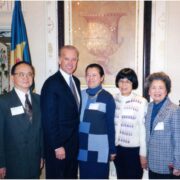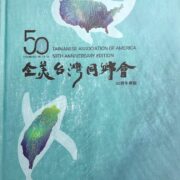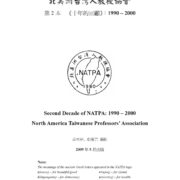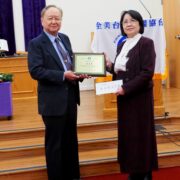Brief Introduction to the Taiwanese Hakka Association of the East Coast
Author: Chiou-Hung Chen
At our first party, held in New York on November 28th of this year, a Taiwanese community member looked around and discovered that they were looking at an entirely different set of faces. He asked another community member, “why don’t I recognize anyone?” It turned out that he had mistaken the “Hakka Association” for the “Hakka Benevolent Association of America,” and thus had inadvertently boarded the “pirate ship.” Previously, there was only one Taiwanese American (New York) Hakka association to participate in. When this community member received a notification about the Hakka Association, he joined. When the Benevolent Association saw the establishment of this association, they changed their name to the “Taiwanese Hakka Benevolent Association of the East Coast.” Due to this difference between the words “Association” and “Benevolent Association,” the community member was unnecessarily left confused. For this, the Benevolent Association’s sudden name change is responsible. Seeing as how this happened, we must briefly introduce our association and its establishment here.
In 1974, a group of old friends who lived in New York were visiting their friend Chen’s home, where they collectively agreed that Hakka people needed to be able to regularly meet and connect with one another. They held their first dinner at Central Park, which drew approximately 40 attendees. In the beginning, the association was purely intended to help relieve homesickness, and it had no particular political leanings. Not long after, however, passionate left-wing community members with the last names Huang and Liu began leading the association, but people didn’t really care what the president’s political beliefs were, since in the end, there was only this one group. After a few years passed, the association suddenly changed its name to XXX Benevolent Association of America. How the group swung from left to right and how the right seized power are things that I don’t know, since I had already left New York. These matters can only be reported on by people who were there to witness it.
After this shift, the President’s words were nearly identical to those of the Central Daily News. Though the organization claimed to not talk politics, its President frequently acted as a mouthpiece for the Taiwanese government. He went in and out of the Taiwan National Development Council and applied to run as an overseas anti-democratic Legislative Yuan Member in the Oversea-Constituency Seat. Whether intentional or not, he was used as the bannerman of the counter Taiwanese movement. His reputation amongst Taiwanese people is extremely bad, and any Hakka person with a conscience feels disgraced by him. After this, any time the Hakka Association did something, the Hakka Benevolent Association was there to counterattack. The “Taiwanese Hakka Association of the East Coast” was established in July, and the “Greater New York Hakka Benevolent Association” also changed its name to the “Taiwanese Hakka Benevolent Association of the East Coast” with the goal of causing confusion. In any case, during the 70s, the island of Taiwan was experiencing a number of historic events. With the Formosa Incident, the trend towards democracy was surging, but the Hakka people were like stragglers; their proposals and voices were weak, and though some fought hard for the Tangwai (“outside the party”) movement, others continued to sing of “Central Plains Consciousness,” and some continued to act like rule-abiding citizens. But most Hakka people did not awaken from their deep sleep.
Overseas Taiwanese have also entered a more diverse society. Though Hakka people had loosely organized Hakka organizations in a number of places, they seemed to have no response to the ever-changing situation unfolding on the island of Taiwan. Hakka people did not speak out as they should have, instead allowing the Benevolent Association to speak for Hakka people as our “representatives.” This association was created so that the Benevolent Association could no longer bring us shame, and so that we could rebuild the image of the Hakka people. One of our association’s goals is to provide Hakka people with a different kind of place to which they can belong.
In the past, many Hakka community members were separated amongst different Taiwanese organizations, working hard for the whole Taiwanese community. Whether or not it is visible, these people accomplished many meaningful things for the Hakka community. While working with other Taiwanese community members, they fought for Hakka people’s rights and increased others’ familiarity and understanding of Hakka people. Their work has set an example for the kind of sacrifice and dedication we should have for the Hakka community. In the future, we must work even harder to encourage our community to participate in the Hakka Association’s affairs, without separating Hoklo and Hakka.
Over the years, Hakka community members have fought to have Hakka programs at Taiwanese summer camps. They have invited Taiwanese Hakka Cultural figures with the Hoklo Taiwanese to share their culture and promote a better understanding of their communities; these programs have been truly extraordinary.
In 1985, Mr. Chao-mei Chung was invited to give a speech in the Hakka language at the Taiwanese Summer Conference – East Coast, and Mr. Fu-Tong Hsu provided a live translation. Many of the Hakka conference attendees were very moved to hear the language of their hometown at a summer conference primarily run by Hoklo people.
In order to take better care of the increased number of Hakka people attending the summer conferences, someone suggested the creation of a Hakka department, so that Hakka people could take care of Hakka people’s needs as is natural and appropriate. At the summer conference of 1986, I called a meeting. There were fifty or sixty Hakka community members, who usually saw each other around at the conferences but didn’t realize the other was also Hakka. Now that we’d all showed up and gathered together, we felt even stronger that we needed to form an association so that in the very least, we could reminisce about our hometowns during the summer conferences.
However, once the once-a-year summer conference ended, Hoklo people still had Taiwanese Associations in their various communities, but what about Hakka people? What about people who didn’t want to join the Benevolent Association? This was yet another reason that we had to create our own association. We usually worked together with other Taiwanese people out of a sense of responsibility from being part of the Taiwanese community, trying to increase our communities’ mutual understanding of one another. On the other hand, however, it is only natural that only an independent organization would be able to fulfill the special needs of the Hakka community (language, culture, etc.). To consider it from the Hakka people’s perspective, there should be an organization to do the work of identifying with our hometown, enhancing the status and dignity of the Hakka community, fighting for its rights, and speaking out for it. These are even more reasons that our association was established.
Since our association advocates for treating Hoklo Taiwanese and Hakka Taiwanese like brothers, we encourage our Hakka members to participate in Taiwanese events. There are some Hakka community members who claim that we are just “an appendage of the Hoklo.” There are also Hoklo with very deep misconceptions (probably due to the reputation that the Hakka Benevolent Association has gained over the years), who wonder what the Hakka people are up to this time? None of this can stop the general direction of our association’s development, however. Fortunately, most people who have joined don’t discriminate between Hoklo and Hakka, which is very encouraging.
In this multi-cultural overseas environment, the Benevolent Association has its own beliefs, while we have our own. We respect each other and aren’t interested in doing anything disgraceful; this is a blessing for the Taiwanese Hakka people.
As for those Hoklo people who don’t think Taiwanese Hakka people need their own association, we suspect they are Hoklo Chauvinists. Though they don’t do it intentionally, they are basically ignoring the existence of the Hakka people. Hakka people should be able to organize affairs for themselves, for only Hakka people are capable of knowing their own community best. Only if we have the same goals and ideals, stand on equal footing, and respect minority groups will be able to convince people and unite our strengths in order to all contribute towards a greater goal.
Our association still has many places where it must improve. Presidents have come and gone, but the supportive members who enthusiastically participate in the association’s activities are its greatest asset. As the first president, I have done my best to keep the association on track so that the next president will have a perfectly planned trajectory to follow, allowing the association to continue to develop in a healthy way. More important is the continual support and participation of the community, and that they express their opinions. Will this association be able to continue its development long-term? In order to gradually grow, our association is relying on all of us to cooperate and work hard!
Sourced from the Taiwan Tribune, Issue no. 636 /1988/02/04
Translated from 18. 威郡台灣婦女會 /2014/09





